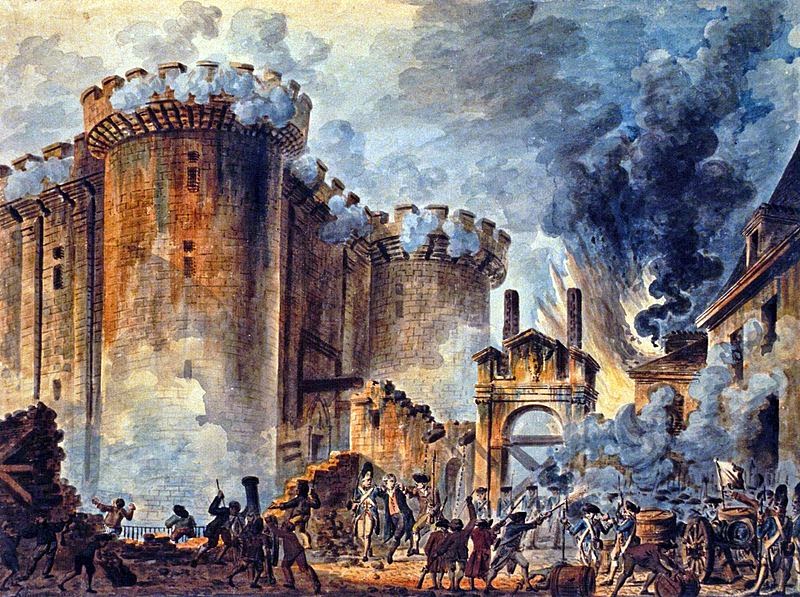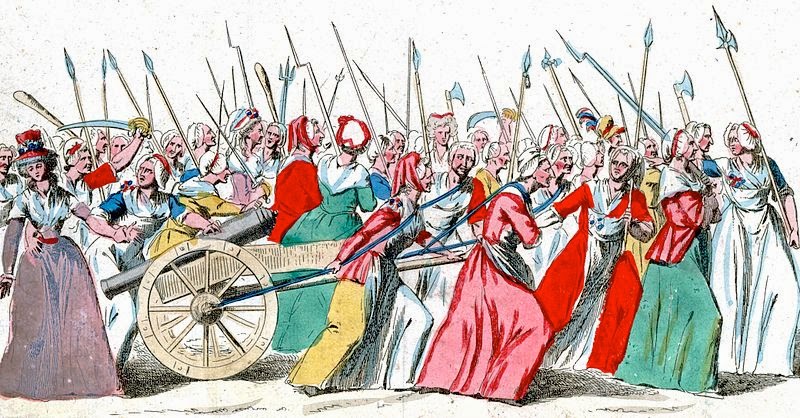The Storming of the Bastille by Jean-Pierre-Louis-Laurent Houel
* Charles Dickens wrote fifteen novels, the final book remained unfinished at the time of his death. Two out of the fifteen were historical fiction - Barnaby Rudge, written in 1841 and A Tale of Two Cities in 1859.
* A Tale of Two Cities begins and ends with famous lines that are familiar even to people who haven't read the book.
* A Tale of Two Cities begins and ends with famous lines that are familiar even to people who haven't read the book.
* The 'Two Cities' refer to London and Paris where the story takes place.
I'm a long-term admirer of Charles Dickens' writing, but some of his books have more developed plots than others and flow with an intensity that sweeps the reader along, regardless of the fact that they are often convoluted sagas. A Tale of Two Cities is certainly in that category, although it is shorter in length (about 450 pages) than some of his others.
Dickens paints a large canvas in which the atmosphere of London's Old Bailey and the unrest and terror of the French Revolution form the background. Against this background he places such memorable characters as Mr Cruncher, the grave robber, and Mr Lorry, the old faithful friend and 'man of business.' Miss Pross, the devoted servant; Madame Defarge, formidable and implacable, and Sydney Carton, the dissolute young man - not to mention the three main characters - Doctor Manette, his daughter Lucie and Charles Darnay - plus a host of seemingly unconnected individuals.
One of the most pleasurable aspects of reading Dickens is the way he handles both tragedy and humour, often in quick succession, without losing the sense of either. He is an expert wordsmith.
...Mr Lorry looked at Jerry in considerable doubt and distrust. That honest tradesman's manner of receiving the look, did not inspire confidence; he changed the leg on which he rested, as often as if he had fifty of those limbs, and we're trying them all; he examined his finger-nails with a very questionable closeness of attention; and whenever Mr. Lorry's eye caught his, he was taken with that peculiar kind of short cough requiring the hollow of a hand before it, which is seldom, if ever, known to be an infirmity attendant on perfect openness of character.
"I should have hoped, gentlemen both," said the spy, always striving to hook Mr. Lorry into the discussion, "that your respect for my sister—"
"I could not better testify my respect for your sister than by finally relieving her of her brother," said Sydney Carton.
It was in vain for Madame Defarge to struggle and to strike; Miss Pross, with the vigorous tenacity of love, always so much stronger than hate, clasped her tight, and even lifted her from the floor in the struggle that they had.
So far I've read eleven of Dickens' novels and have re-read some of those. A Tale of Two Cities is high on the list as one of my favourites. Besides being a great story, Dickens' use of the historical context recreates the time period in a way not easily forgotten.
My favourite books by Dickens are:
A Tale of Two Cities
Bleak House
David Copperfield
Our Mutual Friend
Hard Times
A Tale of Two Cities is scheduled as a free read in Year 9 of the Ambleside Online Curriculum but it would also be a worthwhile read aloud.
Madame Defarge's culminating vengeance grew from the injustice her family suffered, but in the end she became a perpetrator of injustice herself.
There were many women at that time, upon whom the time laid a dreadfully disfiguring hand; but, there was not one among them more to be dreaded than this ruthless woman, now taking her way along the streets. Of a strong and fearless character, of shrewd sense and readiness, of great determination, of that kind of beauty which not only seems to impart to its possessor firmness and animosity, but to strike into others an instinctive recognition of those qualities; the troubled time would have heaved her up, under any circumstances. But, imbued from her childhood with a brooding sense of wrong, and an inveterate hatred of a class, opportunity had developed her into a tigress. She was absolutely without pity. If she had ever had the virtue in her, it had quite gone out of her.
Unforgiveness, injustice and revenge; loyalty and self-sacrifice; faithfulness, courage and love - there is so much in this book that lends itself to some great discussion.
Women's March on Versailles 1789
...the day came coldly, looking like a dead face out of the sky. Then, the night, with the moon and the stars, turned pale and died, and for a little while it seemed as if creation were delivered over to Death's dominion.
But, the glorious sun, rising, seemed to strike those words, that burden of the night, straight and warm to his heart in its long bright rays...
A trading-boat, with a sail of the softened colour of a dead leaf, then glided into his view, floated by him, and died away. As its silent track in the water disappeared, the prayer that had broken up out of his heart for a merciful consideration of all his poor blindness and errors, ended in the words, 'I am the resurrection and the life.'


No comments:
Post a Comment